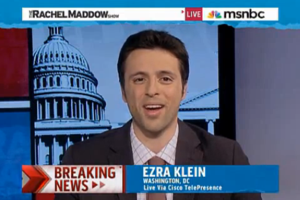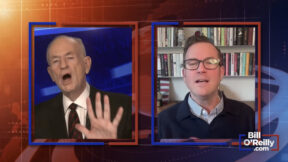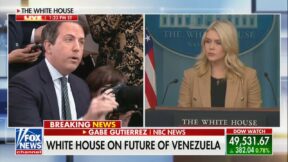Politico: Why Do “Pipsqueaks” Like Ezra Klein Have Assistants?
Famous young internet journalist Michael Calderone has penned an in-depth analysis of famous young internet journalists and their newfound relevance in the media market– and what it means for the older, established class of print reporters. Needless to say, the people who spent most of their twenties reporting on lost puppies and local fires are not too happy about the success of people like Ezra Klein and Chris Cillizza.
Calderone reports the rise of the young blogger with little “real news” experience is concerning to some who view the influence people like Klein, Cillizza, new Washington Post hire David Weigel as a threat to the ailing body of old-school, objective newspaper and network programming news. This crop of twenty- and thrity-somethings, Calderone writes, are simply no longer averse to bias and see no benefits to making a name for themselves on unwanted news beats:
They offer an edgy style and expertise in a particular field, but have never spent a day covering cops or courts or county boards — traditionally the rungs of the ladder all reporters had to climb… While still in their twenties and thirties, this new breed is winning TV time and book contracts, and, in many cases, newsroom salaries that reporters in their forties or fifties can only dream about.
Nonetheless, elder statesmen like Newsweek‘s Howard Fineman take issue with the fact that “many [new writers] lack journalism experience outside the Beltway.” It is the chasing after hurricanes and interviewing county sherriffs that gives a journalist their seasoned experience, he argues.
But deeper than that, there is a key generational difference in attitudes towards bias. Subjectivity was a dirty word for many of the more established writers; young bloggers are open about their beliefs, and often more open to discussion with the other side for it. Klein, for example, is a former Prospect writer and admitted lefty who, despite being on an angry rampage lately since politely disagreeing with the Wall Street Journal‘s Shelby Steele and railing against grilled vegetables, is usually mild-mannered enough to make for intelligent discussion with the other side. His colleague Weigel, a former Reason correspondent, is so open-minded he shot a segment for Keith Olbermann the other night.
Needless to say, not everyone in the industry is particularly upset that the new breed of journalist is an opinionated blogger that can only be trusted to adhere to their bias. A cheerful Andrew Sullivan tells Politico that “trust in the old media brands is largely over. Everything has an individual character or dies,” and he doesn’t sound particularly upset about it. Then again, Sullivan was one of the first to acknowledge the power of the internet and get on the blogging bandwagon.
In the end, it’s not entirely the bloggers’ fault that their stock is rising. After all, Klein wouldn’t have assistants do research for him if the Post didn’t give him that privilege, nor would Weigel hop from a libertarian magazine to a Beltway blog to a major newspaper without some seasoned reporter giving an ok along the way. But the fear of being outdone by “pipsqueaks” with laptops is only going to rise as the panic to “save” old media increases.






Comments
↓ Scroll down for comments ↓